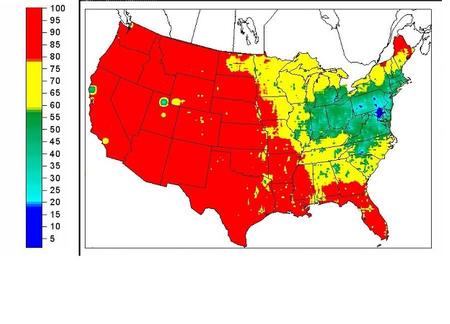For Immediate Release: September 28, 2011 During the Constitutional Convention of 1787, a plan was hatched to save money and safeguard against the power of a new federal government by placing a Constitutional limit on the size of the U.S. Army at 5,000 soldiers. General George Washington dryly told the Convention it was a wonderful idea that he supported, as long as an amendment was added to limit the size of any opposing army to 3,000 men. History records the raucous laughter of the Convention, and the good-sounding but bad idea was dropped.
We should take heed of Washington’s advice today as we face an equally rigid limit on American jobs imposed by federal regulation. Just as in 1787 as we debated each clause of our constitution, we must consider whether the regulations we debate today will also be equally levied on our competitors in an unforgiving global marketplace. Failure to achieve regulatory parity is to leave our country open to economic conquest, the same as unilateral restrictions on our army would lead to military conquest.
The current debate in Congress over the tidal wave of regulations pouring from the Obama Administration needs careful examination on these grounds. EPA’s new regulations on Portland cement production, cross-state air pollution, and industrial and institutional boilers are prime examples.
Portland cement is the number-one construction product in the world. It is essential to nearly every project, especially the road and bridge construction the President is proposing under his latest stimulus plan. U.S. Portland cement producers have for years operated their plants under existing environmental regulations, and are in agreement that we can tighten up those regulations to further decrease emissions, including emissions of mercury. Mercury is a naturally-occurring element which is released by cement plants, coal-burning electrical production facilities, institutional boilers, and other industrial applications.
The problem is that instead of writing achievable goals for cleaner air, the regulators have proposed new rules so draconian that the EPA itself estimates that American cement plans will close, American workers will lose their jobs, and cement production will shift to Asia.
Now we’re back to George Washington’s dilemma – but in spades. Not only will those Asian plants not be operating under any of our current or proposed regulations, they will be spewing their mercury emissions into the upper atmosphere which are then caught in the jet stream and dropped on America!
A map produced by the Electric Power Research Institute shows the shocking effect of the current Asian pollution on America and the globe. The ultimate irony is those same EPA regulators admit the possibility that their new rules could result in a net increase in global mercury pollution, as clean American production is replaced by dirty Chinese production.
Percent of mercury deposition originating outside the United States
Source: EPRI

If you live in Texas, you are probably already aware of the similar job-killing effects of the proposed cross-state air pollution rules. The EPA claims they can trace pollution in one area of Illinois back to Texas power plants, and have demanded new rules that will put multiple Texas power plants and mines out-of-business. Texas energy company Luminant has already announced the closure of two power plants and three mines, and the layoff of an initial 500 workers as a direct result.
And all this while ignoring the biggest cross-state, cross-nation, cross-continent air polluters in the world - our Asian competitors in the global market.
At stake is an estimated 183,000 jobs lost each month for the next decade as a result of just these four regulations. To put that in perspective, we need to create a minimum 125,000 new jobs a month to keep up with our population growth just to freeze our current awful 9.2 percent unemployment rate. These regulations alone are estimated to kill a total 1.65 million American jobs by the end of this decade.
We can and should have commonsense protections for our health and environment, along with workplace and product safety, and decent wages. We can and should have free trade. But we must be very careful we aren’t destroying American jobs by failing to maintain some sense of parity between our country and our competitors on regulatory policies.
This fall House Republicans are pushing legislation weekly to rollback the job-killing red tape of unelected federal bureaucrats. I am continuing to push legislation calling for a two-year freeze on all new major regulations, in hopes that a two-year breather from unknown new costs and burdens will encourage some of our businesses to start hiring again.
I have also partnered with Senator John Barrasso (R-WY) on an effort to revive use of the Congressional Review Act, which allows Congress an expedited means to block new regulations before they take effect, rather than having to combat them after the damage has been done.
We know from history what General Washington would propose. He would say fine to the new environmental regulations but be sure to include China and India in that cross-state rule the same as Texas – or drop the rules.
Contact: John.Stone@mail.house.gov; (202) 225-3864
U.S. Rep. John Carter
31st District of Texas
409 Cannon House Office Building
Washington, DC 20515 | 
